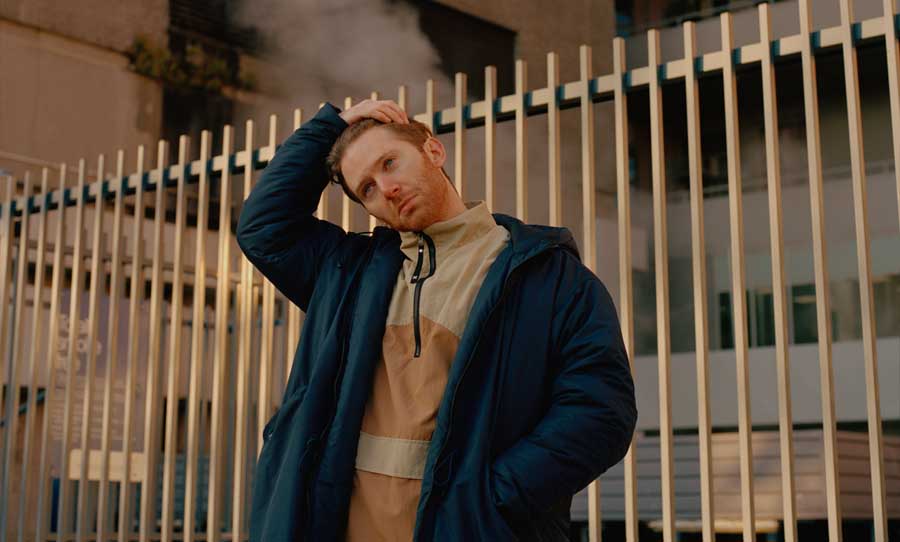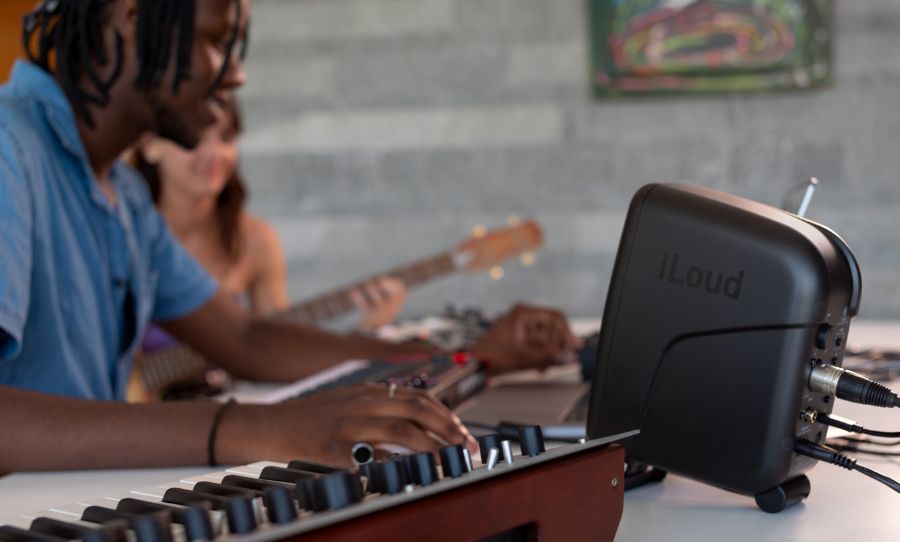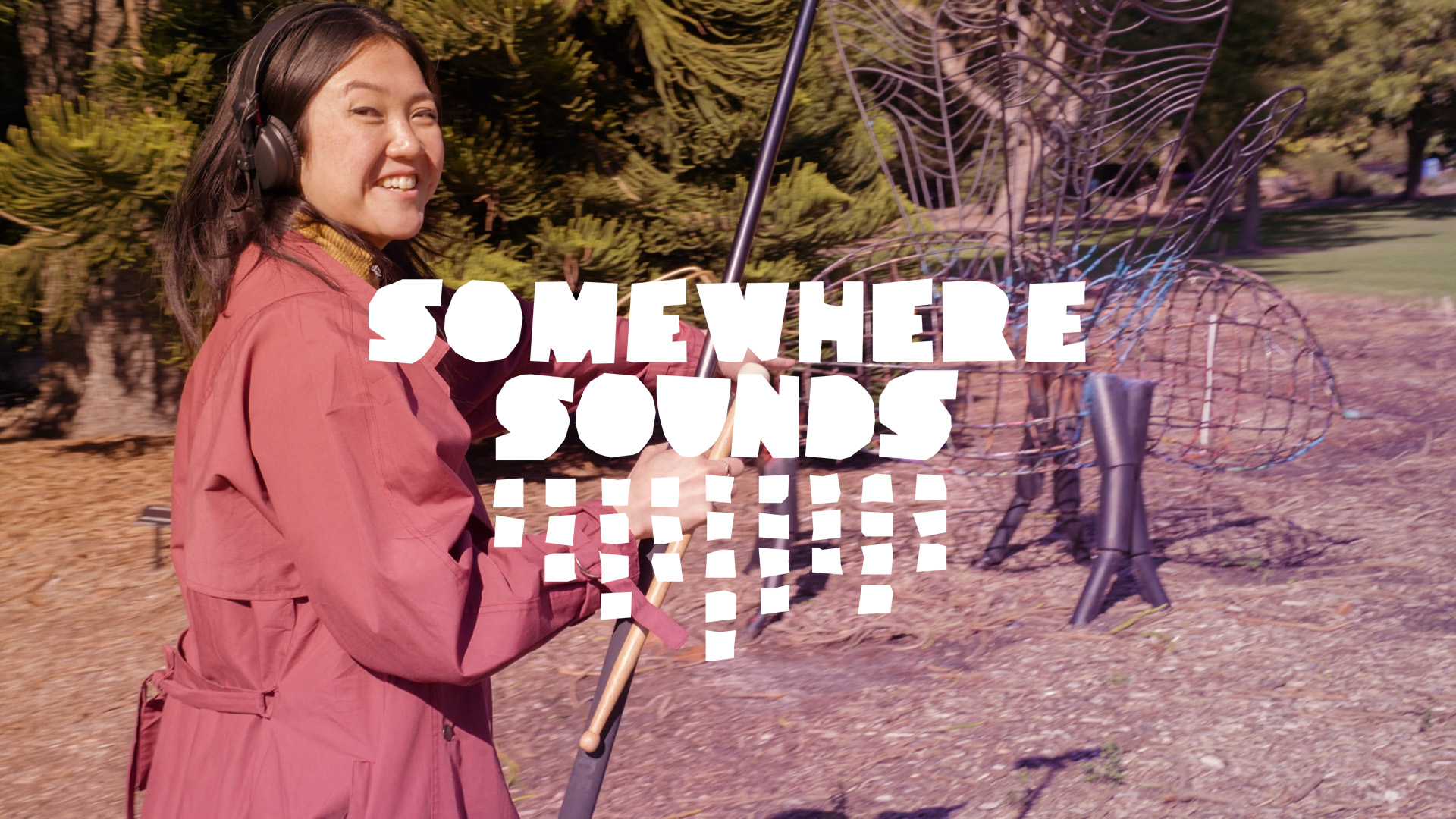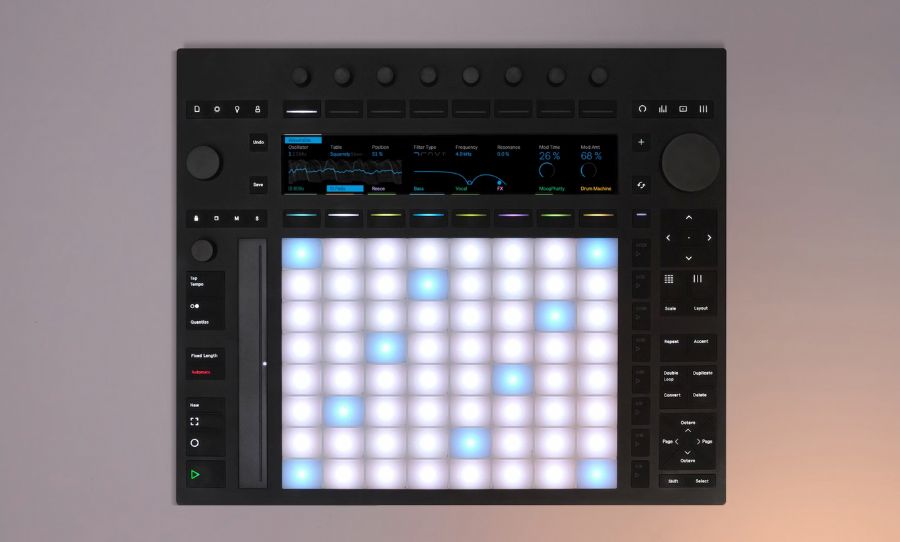Fractures is Mark Zito, a solo producer, singer, and songwriter living in Melbourne. His latest EP III sees him step more broadly – not to mention confidently – into the world of pop; the choruses are bigger, the hooks are spikier, and everything shines with that warm and glossy feeling the genre should conjure.
But for all the space and grandeur his songs may evoke, Zito’s studio isn’t too decked out. Nestled into a single room in his North Melbourne apartment, it doesn’t extend far beyond computer, keyboard, and mouse. When I was there, a few guitars and MIDI controllers lay about the place and Zito’s screen was decorated by an especially crowded Logic Pro session, generating the distinct feeling that deeper processes lay beneath the minimalism.
In that room we spoke at length about the Fractures writing process, the joys and qualms of internet-based collaboration, the new EP, and the many projects beyond.
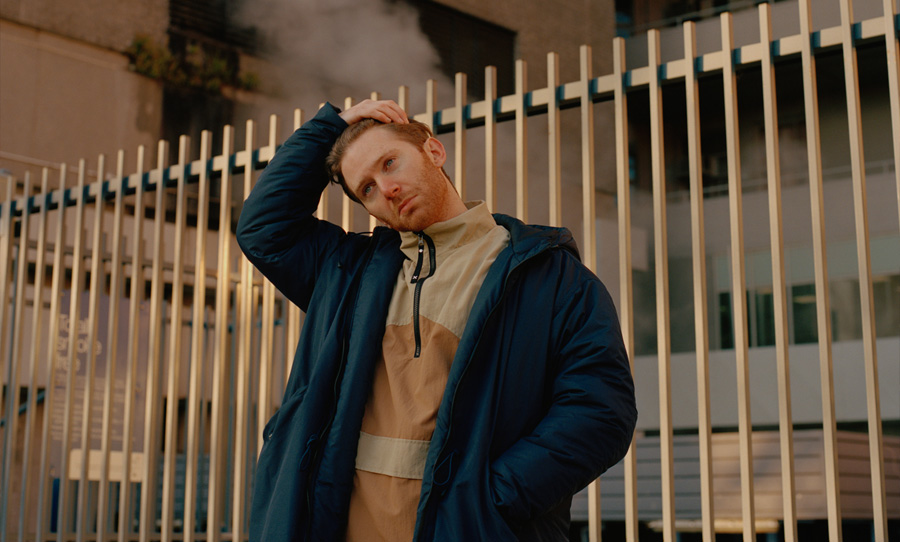
Fractures has released EP III, a stunningly composed collection of pop-leaning tracks, but this is hardly the start or end of his journey.
HAPPY: You’re still very much like an in-the-box producer?
MARK: Yeah. ‘Mark points at the computer,’ that’s a little annotation. For the new stuff especially. It’s poppier, so it kind of serves its purpose being computer-based for the most part. The last EP was a bit more of the indie rock/pop thing so I was pretty insistent on getting real amp tones and getting live drums and things like that, but this time it’s so overproduced and over-hyped. The computer was the obvious place to go and I’m very accustomed to it.
HAPPY: What DAW are you using?
MARK: Logic, always have, always will. I’ve got Ableton and stuff for my live show but I’ve never really given it the love it deserves to figure my way around it. I get by with Logic, I know enough to make it sound good, I’m probably quicker than a lot of people, but there’s a lot of stuff I’m not using it for that I should. It’s good, I love it, it’s kind of a nice halfway point between something that’s good at mixing and something that’s good for creative.
HAPPY: I think what I’m finding is more and more is people are using DAWs like that; picking what’s great for recording or idea generation, then something for mixing. I will say most electronic producers I’ve spoken to will record in Ableton though, then maybe mix in Logic or Pro Tools.
MARK: That’s interesting. Recording in Ableton for me was too haphazard and it didn’t make sense because I do a lot of takes and [Logic] stacks it and it just coordinates it for you without having to think about it. I feel like Ableton opens you up to more creative possibilities instantly, whereas with this you have to work to get there but… I’m a patient guy. I get there eventually.
[Tom points at the computer]
HAPPY: That does look like a pretty heavy session.
MARK: That’s a live one, that’s the start of a song. The ones on the EP are pretty hectic, the computer didn’t love doing them but it’s not up to the computer. It’s up to me.
HAPPY: Is there such thing as too many overdubs?
MARK: Yeah, very much. I’m right as close to the threshold as you get. On the last EP particular… vocal overdubs coming out my ass, like stacks on stacks on stacks. I tend to be a bit heavy handed with layers, so I sometimes have to strip things back because I get too excited about trying to get at all these awesome sounds in the one part of the song. It’s been a learning process.
HAPPY: It is very tempting to just get in deeper and deeper. Are there any other kinds of restrictions that you apply on yourself?
MARK: Not particularly. In the early days I used to write it to my live show, going ‘I’m gonna have a five piece; two guitars, keys, drummer, myself.’ So I wrote to that. Now you know, backing tracks being what they are and I know how to run those shows, I can [write] with a little bit more abandon. Then when I get to the end of a song it’s like ‘this is gonna be weird to play live because it’s just gonna be coming out of the computer’ which I don’t love, but I guess it was my decision to make that a problem.
HAPPY: Gotta learn some dance moves.
MARK: Pretty much, I don’t know what to do onstage. Usually there’s a guitar which is fine, I don’t have to move my hands.
HAPPY: So as long as there’s a guitar there?
MARK: As long as there’s something I can grab on to, like the microphone stand. People get away with it. Liam Gallagher, is he the singer? He just stands there with his hands behind his back. It’ll be interesting because I haven’t played a live show with the new EP.
HAPPY: That’s on the cards though?
MARK: Definitely my preference! I don’t have anything booked but the preference would be to play live because that’s the second part of the whole connection thing, and as much as anything I just want to see how they go live, see if people dig them or not. The stuff following this EP – I’ve got like an album’s worth already – is even more electronic, like dance-y almost.
HAPPY: So you’ve got to bridge the gap.
MARK: Yeah, baby steps. I’m not gonna go straight out to being a button pusher but I’m well on my way.
HAPPY: When you’re in this home environment, when you’re running guitars, are you mic’ing up the amp or are you using simulators?
MARK: In the time I’ve lived here I think I’ve mic’d up that amp once or twice. In doing the last EP last year, Reset, it was… I definitely want a guitar rig, the Native Instruments one, they’ve got emulations of a [Fender] Twin Reverb or a [Roland] JC 120 or whatever, so I demoed them and then I said ‘ok I’m going to go to Sing Sing [Recording Studio] and I’m going to re-amp them with their nice collection of amps,’ which pretty much matched what I’ve been demoing anyway. We spent the whole day there, I spent a grand on it, then by the end of they pretty much sounded exactly the same so I was like, ‘I think I can kind of get by.’ Especially on this poppy stuff where I don’t think people are looking for that anyway.
HAPPY: It’s probably a little buried, but also amp simulations are really legit now.
MARK: They’re great! I just got [IK Multimedia’s] AmpliTube 4 the other day. You know, maybe not the legitimate version, but I got it. That’s just a whole new possibility of sound, it’s great. It’s one less thing to lug. If you running ears as well… getting an amp mic’d up then running it through ears, that doesn’t sound like the amp anymore, it sounds like it’s been EQ’d and stuff. I don’t know, I’m not really that precious about that kind of thing.
HAPPY: You said before that you’d considered buying accents.
MARK: Yeah. But do you see any?
HAPPY: I see some [MIDI] controllers. Safe to say you’ve dipped into the soft synth world?
MARK: Very much. I treated myself to the Arturia Collection recently.
HAPPY: The legit version of that?
MARK: Very much so. I’m trying to legitimise! I’m pretty much 80 percent there I reckon, legit stuff. But that’s got the Prophet, I mostly use that – because the others, as nice as it is to have them on the computer, they make them more controllable which is kind of intimidating sometimes. They add all these new matrixes and things so you can do this and that you control…. I just want to have the synth how it would have been, without all the extra stuff. I’ve only just figured out how a synth really works. It’s very much just tweak and see what happens.
HAPPY: Well the Prophet is probably one of the best for visualising the very like basic aspects of what a synth does.
MARK: It has helped, but then they’ve got like the modular ones where the computer is mimicking the whole cable thing. I’ve got it all here.
HAPPY: So you don’t have to leave this room?
MARK: Well I’m pretty antisocial at the best of times, so if I can stay in here – I lose my marbles a little bit… maybe that comes out in the songs. My life’s very turbulence-free, so I need something to write about. The mind starts to go a bit weird but that’s good.
HAPPY: You’ve opened up a bit to internet collabs. How did these relationships come about, with ROZES for example?
MARK: Admittedly, that was about the opposite of organic as you can get. It was orchestrated through my label, I had this song Chains – which initially I’ve written about five years ago and didn’t sound anything like it does today – it was always there as the probably the most hook-heavy song I’d written up until that point. Eventually it made sense to me when I was like ‘I think I’m ready to do pop stuff.’ I re-jigged the song to make it a bit more contemporary – also my skills had gotten better so I made it sound better – and I finished it as a standalone with just me singing and then it was kind of raised like, ‘maybe you could collaborate, would you be open to doing it as a duet?’ Because it lends itself to that with the story in the song, and I was like ‘yeah fine, but who?’ They reached out for me then found ROZES and she put her own spin on a few little melodies here and there, changed the lyrics incrementally, and came back to me. With one or two back-and-forths it was pretty much there. It was new, I’d never really done that before without being in the room with someone. Even… I did one with Lane 8 but he ended up coming here, coincidentally, so I still got to meet him. So this was the first time it was a purely email-based back and forth and it was interesting. I’m not necessarily rushing to do it again, if there was a hierarchy I’d like to meet the person. But it worked out really well, sounded really good. People seem to like it.
HAPPY: Because it is becoming more common. People are a bit more displaced. Is that fact that you’ll probably never be playing this song live together a consideration?
MARK: It wasn’t until after the fact, to be honest. That’s the conundrum I have, do I put her on tracks and just have a ghost sing it? Maybe I’ll go the hologram route, I don’t know. Or do I call in the local female singer who I can find or I know? Which is probably a little bit move viable, so it’s a bridge I’m yet to cross but it probably wouldn’t limit me – in the same way that you know, doing a million layers in Logic isn’t going to limit me. As long as it serves the song I’ll release it and then I’ll worry about the rest later. It can all be achieved-ish through tracks and computer wizardry.
HAPPY: And this isn’t a situation where you’re just the producer and you can’t sing. Was there any difficulty in letting somebody else take that part of one of your tracks?
MARK: Yeah, I mean the jury’s out on whether I can sing or not… I’ve actually literally started taking singing lessons. But I probably do have a little bit of, you know… I would say I’m a control freak in a general sense, but when you’ve spent that long on something, and then for someone towards the finish line to change even the smallest aspect of it, it’s a little bit jarring. So when it initially came back, admittedly, I was kind of like, ‘oh, I don’t know about this.’ Myself and my manager were in the same boat and then pretty much universally everyone else was like, ‘oh that’s great!’ We were just so attached to the song that we couldn’t really comprehend it in any other form. So yes. For this EP I’m definitely opening up to that. After like seven years of doing this. It’s taken a while.
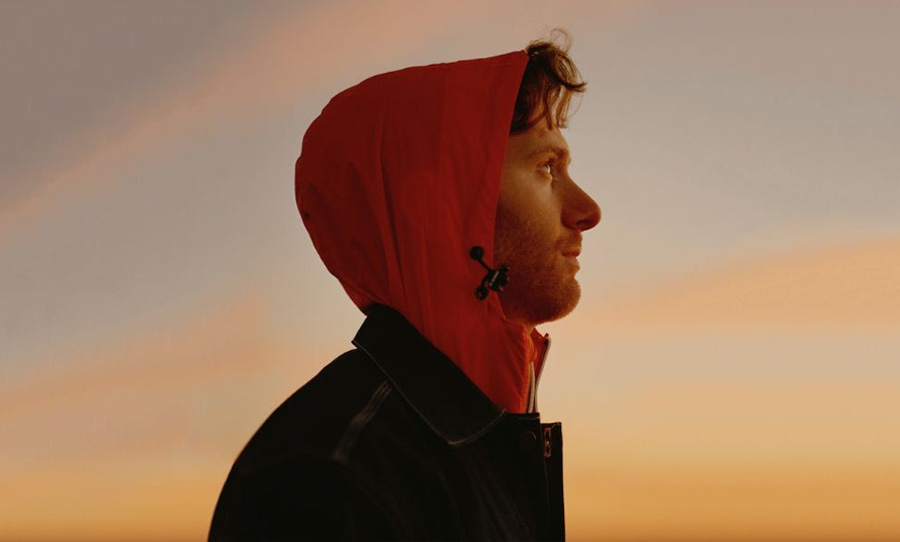
THAPPY: These are more pop songs, but has the way you start a track changed at all?
MARK: Not overly, maybe early days I might have been more guitar driven – even the last EP was. Having said that a lot of the songs will start with a synth sound or a drum sound/beat, and then everything else will be about filling the gaps. I can do the real traditional singer/songwriter thing if I really, really try but it doesn’t come as naturally to me for whatever reason. So no, I wouldn’t say the pop stuff was overly different in the process from conception, it was just more where it ended up. I had a bit more of a goal in mind that was on the pop side of things. And mind you, I think four or five of the songs were co-written as well so that probably informed them a bit, probably pushed me in a different direction. Three of which I wrote with my old mate Will [Luby], when we sat down we said they’d be pop songs and they sat there for a while. When I released them they were already pop songs – I was like, ‘I don’t mind releasing pop songs.’
HAPPY: Is that an attitude you’ve come into over time?
MARK: Pop? I was never against it again, my early stuff was more or less pop – electronic pop, maybe more of the indie side of things, it wasn’t quite as polished. Because quite frankly, I didn’t have the skill set. But now I do. I love listening to pop music and it was always going to happen. I suppose from an outside point of view people say ‘oh he’s doing pop,’ but most of the songs were written like three, four years ago. So it’s just been there and I’ve been trying to get the other songs out so these ones can come out – it’s the same thing with the future stuff which will be dance stuff and then I’ve got more… not quite funk but a R&B kind of thing sitting there, so it’s all over the joint.
HAPPY: How far ahead are you going?
MARK: As far ahead as I can. I mean, because I’m here most of the time it just builds up.
HAPPY: I don’t think anyone’s really said that to me before – that they’re more than a couple of releases ahead.
MARK: It’s good. It’s equally frustrating at the same time because I’ve written this bank of songs over the last three months and I know that I’m gonna have to wait x amount of time for the first bank and then the second bank’s gonna still be there. And I’ve written a whole other 16 albums, I don’t know, in the meantime. So it’ll be a frustration, but god willing I tour heavily or start collaborating with people. If I don’t get to write songs it’s kind of…
HAPPY: Like an insurance?
MARK: Yeah, pretty much. So there’s a bit of that.
HAPPY: Better to have too much than too little.
MARK: I figure. And I’m pretty realistic about the fact that not all of them are going to come out ever – they’re either not up to the mark or by the time it comes to release it’s like ‘that’s not the one.’
HAPPY: Just do the old anonymous side project move.
MARK: It has crossed my mind, just so I can put it all out at once. And just to see if it gets received any differently! It’d be intriguing, like if someone says no and then you give them the same thing repackaged as Joe Bloggs. And they say, ‘oh, that’s great!’ Well… guess what? That’s when I take the mask off.
EP III by Fractures is out now via FADER Label / Caroline Australia.
